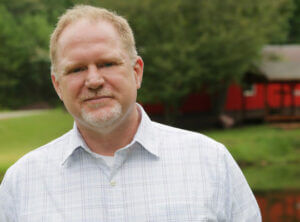 Dr. Garry Barber – Director of Counseling Center
Dr. Garry Barber – Director of Counseling Center
Thanksgiving provides a time to pause and be thankful. Christmas leads us to consider the great gift of our Living Savior. New Year’s leaves us reassessing our lives and futures. Then the season of winter festivities winds down in February with a day of love, hearts, cards, and candy. Don’t you just LOVE the holidays? Well, maybe not. I think we all have a love/hate relationship with this time of year. At every turn we are reminded of blessings and struggles, gains and losses, hopes and fears.
One of the usual struggles of the holiday season is grief. Grief is that experience of being acutely aware of a significant loss. Sometimes those losses come in the form of lost relationships when friendships are broken, romantic connections are severed, children are wayward, or families are rocked by divorce. Career people often experience grief after retirement or layoff. Teens often experience grief due to rejection from peers or the loss of identity in the continual shifting sands of adolescence. Regardless the cause of grief, it is common for the experience to be felt more deeply during the winter holidays when traditions, advertising, movies, and events are focused on relationships.
Bereavement over the death of a loved one is often the most painful kind of holiday grief. Many people live through a scene like that of the Cratchit family (in Charles Dicken’s “A Christmas Carol”) when the ghost of Christmas yet to come reveals Tiny Tim’s empty chair. Readers connect to the grieving Cratchits because most have sat under the somber shroud of grief and known the awkward mixture of reliving the joy of holidays gone by while sitting in the sorrow of the broken family circle.
What hope is there for those with holiday grief? The ancient Persian adage “this too shall pass” is usually true but often unhelpful for the grieving person or family. What many years of counseling the grief-stricken and living with grief personally have taught me is that grief is not something that passes completely, not in this life anyway. I have become convinced that grief is not made up of several well-defined stages as I was taught in college and seminary. I now see grief as an experience better described in cyclical (circular) terms as opposed linear terminology that implies a permanent exit from the pain of loss.
These days, when I think of grief I picture myself on a train. In the late 1990s and early 2000s while serving as a missionary in Ukraine I would often find it necessary to make the long, overnight train trip from Ivano-Frankivsk to Kiev (a cross country journey). I came to know this trek very well and became familiar with the stops at each village, town, and city along the way. Overtime I no longer felt the need to peek out of the window to see what was happening at each station. I became familiar with the experience and learned to relax in it, even to rest. In much the same way grief is a life-long experience with many stations along the way. We travel the circuit of grief over and over throughout life. We visit the stations of sadness, sweet memories, confusion, thankfulness, anger, regret, and other very human experiences. Sometimes we visit these stations as brief stops and sometimes there is some loading and unloading to be accomplished before moving on.
The holidays often bring special meaning or unique pain to these stations of loss. But over time this trek becomes familiar. We learn what to expect. We are no longer surprised by the experience. We do not wish to let go of grieving completely for the grief is part of our connection to the one we continue to love. And so the process continues as a part of our normal life.
I have found the key to surviving and thriving through grief is to “place” the grieving experience. That is, the griever must allow grief its place without allowing it to overwhelm or define them. Denied grief will result in emotional and behavioral manifestations that confuse others and destroy lives. Rage, coldness, anxiety, depression, addiction, and violence are some of the ways that denied grief springs to the surface for those who have thought to bury it. Buried grief becomes a deep root of bitterness that “grows up to cause trouble and defile many” (Hebrews 12:15) as it erupts unexpectedly in the midst of holiday stress.
When grief is thought of in a cyclical pattern the griever (even during the intensity of the holiday season) is able to say, “I am visiting the station of sadness right now, but I know I will not stay here forever. I know I will likely be back here at some point (maybe today or maybe another day) but I know I will also experience the joy of special memories and having fleeting moments of warmness and sweetness as I think of my deceased loved one and the hope of seeing them again someday.” The griever is also aware that as time goes on the pain of visiting these various stations of grief, while not disappearing completely, will lessen in intensity. In this way grief becomes a part of the person while not dominating the person.
As one who seeks to follow Christ and find my hope and healing in the Holy Scripture I will lean into the words of the Bible this holiday season when facing my own grief. I will seek to not “grieve like the rest of men, who have no hope” (I Thessalonians 4:13). I will strive to trust in the promise that death will one day be completely “swallowed up in victory” (I Corinthians 15:54). I will look forward with the hope found in the words “so will we ever be with the Lord’ (I Thessalonians 4:17). But for now, until these hopes are fully and finally fulfilled I will be reminded that it is okay to feel sad as long as I do not get off at that station and make my home there. I will allow myself to experience joy without feeling that I have somehow betrayed the memory of my loved ones or forgotten the pain of losing them temporarily. I will embrace their memory and the pain that accompanies their memory. I will trust in God to take me to the next station in this journey on which I learn to trust Him for hope, healing, and wholeness. I encourage you to do the same as you seek to know the peace of Christ and the comfort of the Holy Spirit during this holiday season.
Garry Barber is a Licensed Clinical Pastoral Counselor (NCCA) who holds Masters and Doctoral degrees in both biblical studies and family counseling. For nearly 3 decades he has sought to guide individuals and families to a healthier, more functional life. The Joy House Counseling Center exists for the purpose of providing a faith-based option for residents of the Highway 575/ 515 corridor who seek guidance with life’s problems. We have locations in Pickens, Gilmer and Cherokee Counties with fees based on income and ability to pay. We offer counseling to all ages, from 7 to 70, with professional services to a wide variety of individuals, families and their needs. Contact our Counseling Center via phone at 678-452-2037 for more information.

